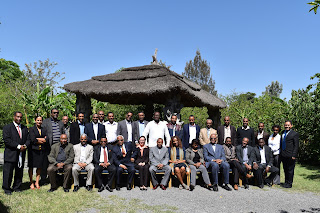(IMAESCII516) Article Review 5: 'Transformative Learning: Theory to Practice' (1997)
Article Reviewed:
Mezirow, Jack (1997). Transformative Learning: Theory to Practice. New Directions for Adult and Continuing Education. 1997 (74), pp. 5- 12. DOI: https://doi.org/10.1002/ace.7401.
Transformative learning allows individuals to construct their own meanings rather than relying on what others convey. The theory makes references to collective narratives of thought and action that has gained through time. The theory also posited that the person makes personal frames of reference to understand what the experiences means, why such events or understanding occur, and how it will help or impact his/her actions and thinking. The reader is made aware that selection bias comes into play, where only those that are relevant, important, and beneficial information brought together will be acceptable for a learner.
The frames of reference have 2
dimensions:
- Habits of Mind - broad, general, organised umbrella themes of specific events, emotions and thoughts. They are categorised that leads one to develop his or her own; and
- Points of View - a web of belief and opinions that a learner values and therefore impact the way how knowledge and information is absorbed and processed by another.
Another theorist, Habermas (1981)
shared his thoughts on what problem solving and learning approaches could transform learning and the learners:
- Instrumental – using utilitarian approach to achieve efficiency; empirical tests are done;
- Impressionistic – one’s ownership of knowledge can be identified to him / her;
- Normative - creates a system of shared values and actions by a particular group; and
- Communicative - sharing through communicating; even reaching common decisions or agreement. Values and beliefs doesn't need not be tested.
As there are many different
interpretations and beliefs that people would hold on to, it is important to
find a common ground between what parties think would be acceptable for
everyone in terms of understanding. ‘Discourse’ is the dialogue that helps
facilitate the formation of an acceptable beliefs or knowledge. This also
allows one to be critically reflective of our own assumptions based on what we
see, hear or read, and thereby helps us transform ourselves.
In such a transformative journey, there are 4 processes one can learn:
- Elaborate- broaden our understanding and the range our beliefs could hold on to
- Establish - we create another way to think about the group since we tend to compare them from our own spheres
- Transform - we allow ourselves to acknowledge the differences and our wrong perceptions about them; leading to tolerance and ultimately acceptance (e.g. the LGBTQIA+ community)
- Awareness of critical biases – to be more contextual and objective rather than subjective.
Autonomous thinking is usually tied up to the idea that information needs to be organised to identify the common (key) competencies a group of workers would need to be better in their roles. This paves for a list of requirements institutions such as the government and enablers such as the employers would require the citizens (the workers) to acquire - and in the process allows them to be more responsible in their choices and decisions on what to do next.
But the problem still remains - as societies evolve, how do we channel the resources to ensure their resilience and remain adaptive yet critical of their learning?
In my opinion, the article presents these
following implications to adult educators:
- It is also important to understand why adults need to be autonomous and responsible - perhaps because they need more practical and short-term applications.
- Do workers have a propensity to think more of the long-term than the short-term goals.
- Can he exercise one's autonomy to engage discourse based on universally-accepted beliefs and norms? Or can he become more self-reassured?
- Can adult educators help them for numerous learning goals?
- Can an educator help students' self-discovery and self-mastery of their own frames of reference?
- Discourse - adult educators needs to help students validate their own understanding, with the right and adequate information and creating the ideal environment for learning, discourse and creating meaning.
- Course design could be more critical, reflective and experiential rather than lecturing 'banking model'; and discover new learning.
- Educator as a facilitator and provocateur - provokes learners to go beyond their usual thinking and eventually transformed in the process.
- Understand that learners have their own predispositions and we need to acknowledge and recognise that in their discussions.
Learning with people from unfamiliar terrains will not only transform them. But more importantly, it enhances your view of life and the things that are happening around you. Does this happen in online learning as well? (Photo by McRhon)


Comments